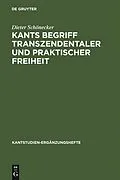Kant writes at one point in the Critique of Pure Reason that practical freedom can be recognized "through experience, as one of the natural causes" (B 831). This claim appears to conflict with a central epistemological theme of his critical philosophy. This work responds by carefully tracing the details of the relationship between transcendental and practical freedom through all of Kant's writings (published works, lecture notes, etc.). Kant uses the term "practical freedom" in several quite different senses and draws on pre-critical theses to varying degrees. While the problematic text has long been noted, there has been no detailed study of its importance.
Autorentext
Dieter Schönecker, Universität Siegen.
Klappentext
Kant writes at one point in the Critique of Pure Reason that practical freedom can be recognized "through experience, as one of the natural causes" (B 831). This claim appears to conflict with a central epistemological theme of his critical philosophy. This work responds by carefully tracing the details of the relationship between transcendental and practical freedom through all of Kant's writings (published works, lecture notes, etc.). Kant uses the term "practical freedom" in several quite different senses and draws on pre-critical theses to varying degrees. While the problematic text has long been noted, there has been no detailed study of its importance.
